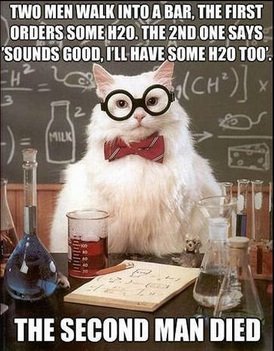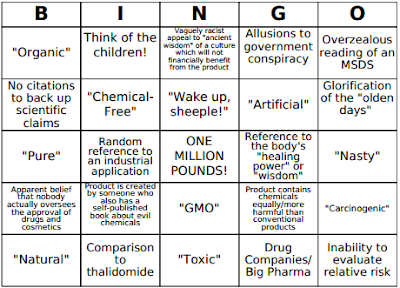It was an unsettling experience, for a number of reasons: they took donations of food for the benefit of inner-city hipsters rather than the hungry. It involved “organic” food, a term that makes people who’ve taken an actual chemistry class roll their eyes. They made mashed potatoes using margarine, which is an affront to everything I value. And, since the produce was “organic”, some of the people working in the kitchen - none of them trained cooks - believed it didn’t actually need to be washed.
I am only a partially-trained cook - I quit culinary school after a professional chef disagreed with me over the existence of anaerobic bacteria. (True story.) However, I am trained enough to recognise grotesque breaches of food safety standards, so please trust me here: produce ought to be washed.
We all encounter food on a daily basis, and so food seems to spark a lot of the more bizarre scientific misunderstandings I come across. It makes me sad to think that people I know might be depriving themselves of an pre-exam all-nighter fuelled by Diet Coke and Mie Goreng noodles, simply because they’ve been told that aspartame and MSG will cause their internal organs to run away in the night.
So, here is a collection of food myths I’ve come across in person: in the organic vegan soup kitchen, at culinary school, posted on my Facebook wall.
“Organic produce doesn’t need to be washed! It’s chemical free!” For reasons which I have previously explained, organic produce is not chemical free. It is not intangible. It is not made of rainbows and the dreams of leprechauns. It’s made of chemicals like carbon and water and vitamins and then it’s treated with (organic!) fertilisers and herbicides and pesticides. (Unless the organic farm has decided to use manual labour instead of herbicides, in which case labourers remove weeds from the crops by hand, leading to crippling injuries.)
When we say organic fertiliser, we generally mean compost or manure. Manure is cow poop. Cow poop was in the vicinity of your vegetables, and then your vegetables were picked by someone who probably wasn’t washing their hands on a frequent basis, and then your vegetables were transported and unloaded by more bare hands and then prodded by an untold numbers of strangers with unknown personal hygiene standards until you chose that one particular head of lettuce. WASH YOUR VEGETABLES.
“If you leave a McDonald’s cheeseburger out of its package it will never rot! It’s not even food!” A McDonald’s cheeseburger patty is made of ground beef and salt. That’s all. But a patty weighs less than fifty grams and is the size of my palm, and because of this high surface-area-to-volume ratio, it’s really easy for any moisture contained in the patty to evaporate when it’s left in the open air. Without moisture, bacteria cannot grow, and the burger will not decay. I considered test-driving this myth by using a control hamburger that wasn't dehydrated, but decided against it for two reasons:
1. If there's a cheeseburger in my house, I'm going to eat it, I don't care if it's a month old.
2. The amazing Kenji from Serious Eats already tested this myth very rigorously.
There aren't any mystery preservatives in McDonald's cheeseburgers. They turn over far too much product, far too quickly, to necessitate the expense of adding extra preservatives to their meat. Also: if the idea of salt and dehydration being used to preserve food is a new concept, then the deli counter at your local supermarket is going to Blow. Your. Mind.
“I’m, like, totally allergic to MSG.” Wow, that sucks! I can't imagine not being able to eat tomatoes or parmesan cheese or Vegemite or any other foods containing naturally-occurring glutamates. Wait - you're NOT actually allergic to glutamates? You just experience a vague sense of ill-health after overindulging in Chinese food? Well, that's been debunked. MSG also won't give you asthma. The evils of MSG, like aspartame, are one of those strange myths that's been tested for decades and debunked every time, and yet still persists through the menace of chain emails.
"But if MSG isn't dangerous, why does every single Chinese restaurant have a big NO MSG sign in their window?"
To be fair, this is a little bit backwards: in the comic, the cereal is advertised as not containing asbestos, even though none of the cereals contain asbestos. (This is similar to olive oil bottles with "NO CHOLESTEROL" written on them.) Conversely, when restaurants advertise that they don't use MSG, it's not because MSG is dangerous - it's because every other restaurant in town has the same sign. You can also see this phenomenon in the milk aisle of the supermarket, where every second bottle has suddenly become "permeate free!"
"Margarine is only one molecule away from being plastic." There are many reasons to avoid margarine, such as:
- The taste
- The taste
- The taste
However, for people who watch out for animal products and/or saturated fats, margarine is a viable butter alternative. It also lasts longer without proper refrigeration (which explains the ubiquity of Blue Band margarine in South East Asia). Is it one molecule away from being plastic? I don't know, and I don't care.
Peroxide bleach is one atom away from being water. Table salt is one atom different from hydrochloric acid. To make a food - or anything else, for that matter - there's only 118 elements to choose from, and only 98 of them occur naturally, and only 80 of those are actually stable. Pretty much everything you encounter in daily life is made of some combination of those 80 elements. Fewer than 30 of them have any dietary value. So, there's necessarily going to be a lot of overlap in the chemical composition of the food you eat.
"Jelly is made from animal hooves! Red food colouring is made from ground-up bugs! Sugar is an animal product!" Actually, these are all true - gelatin is extracted from animal bones, and the food colouring cochineal is, indeed, made from crushed insects. Refined white sugar can be filtered using bone char, which renders it an animal product if you're a strict vegan or obeying religious dietary guidelines.
"You should come eat at this organic soup kitchen!" You should probably ask to see the kitchen before you do this. Please make sure they're washing the vegetables.









